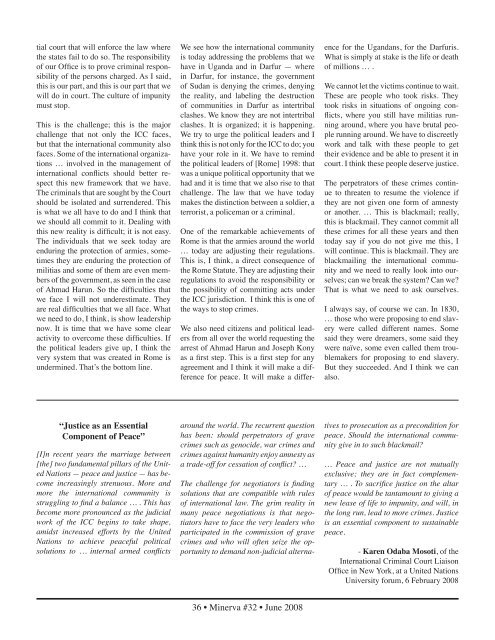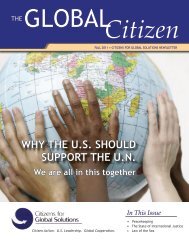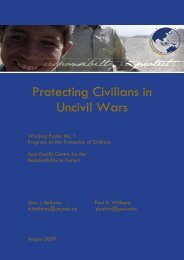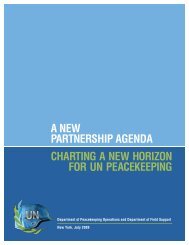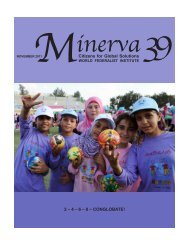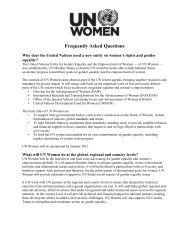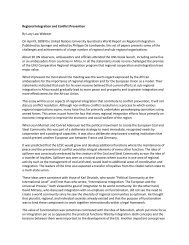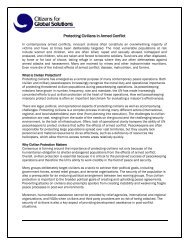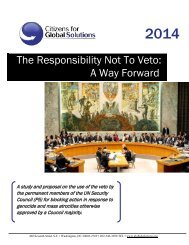Minerva, Spring 2008 (Volume 32) - Citizens for Global Solutions
Minerva, Spring 2008 (Volume 32) - Citizens for Global Solutions
Minerva, Spring 2008 (Volume 32) - Citizens for Global Solutions
You also want an ePaper? Increase the reach of your titles
YUMPU automatically turns print PDFs into web optimized ePapers that Google loves.
tial court that will en<strong>for</strong>ce the law where<br />
the states fail to do so. The responsibility<br />
of our Office is to prove criminal responsibility<br />
of the persons charged. As I said,<br />
this is our part, and this is our part that we<br />
will do in court. The culture of impunity<br />
must stop.<br />
This is the challenge; this is the major<br />
challenge that not only the ICC faces,<br />
but that the international community also<br />
faces. Some of the international organizations<br />
… involved in the management of<br />
international conflicts should better respect<br />
this new framework that we have.<br />
The criminals that are sought by the Court<br />
should be isolated and surrendered. This<br />
is what we all have to do and I think that<br />
we should all commit to it. Dealing with<br />
this new reality is difficult; it is not easy.<br />
The individuals that we seek today are<br />
enduring the protection of armies, sometimes<br />
they are enduring the protection of<br />
militias and some of them are even members<br />
of the government, as seen in the case<br />
of Ahmad Harun. So the difficulties that<br />
we face I will not underestimate. They<br />
are real difficulties that we all face. What<br />
we need to do, I think, is show leadership<br />
now. It is time that we have some clear<br />
activity to overcome these difficulties. If<br />
the political leaders give up, I think the<br />
very system that was created in Rome is<br />
undermined. That’s the bottom line.<br />
We see how the international community<br />
is today addressing the problems that we<br />
have in Uganda and in Darfur — where<br />
in Darfur, <strong>for</strong> instance, the government<br />
of Sudan is denying the crimes, denying<br />
the reality, and labeling the destruction<br />
of communities in Darfur as intertribal<br />
clashes. We know they are not intertribal<br />
clashes. It is organized; it is happening.<br />
We try to urge the political leaders and I<br />
think this is not only <strong>for</strong> the ICC to do; you<br />
have your role in it. We have to remind<br />
the political leaders of [Rome] 1998: that<br />
was a unique political opportunity that we<br />
had and it is time that we also rise to that<br />
challenge. The law that we have today<br />
makes the distinction between a soldier, a<br />
terrorist, a policeman or a criminal.<br />
One of the remarkable achievements of<br />
Rome is that the armies around the world<br />
… today are adjusting their regulations.<br />
This is, I think, a direct consequence of<br />
the Rome Statute. They are adjusting their<br />
regulations to avoid the responsibility or<br />
the possibility of committing acts under<br />
the ICC jurisdiction. I think this is one of<br />
the ways to stop crimes.<br />
We also need citizens and political leaders<br />
from all over the world requesting the<br />
arrest of Ahmad Harun and Joseph Kony<br />
as a first step. This is a first step <strong>for</strong> any<br />
agreement and I think it will make a difference<br />
<strong>for</strong> peace. It will make a difference<br />
<strong>for</strong> the Ugandans, <strong>for</strong> the Darfuris.<br />
What is simply at stake is the life or death<br />
of millions … .<br />
We cannot let the victims continue to wait.<br />
These are people who took risks. They<br />
took risks in situations of ongoing conflicts,<br />
where you still have militias running<br />
around, where you have brutal people<br />
running around. We have to discreetly<br />
work and talk with these people to get<br />
their evidence and be able to present it in<br />
court. I think these people deserve justice.<br />
The perpetrators of these crimes continue<br />
to threaten to resume the violence if<br />
they are not given one <strong>for</strong>m of amnesty<br />
or another. … This is blackmail; really,<br />
this is blackmail. They cannot commit all<br />
these crimes <strong>for</strong> all these years and then<br />
today say if you do not give me this, I<br />
will continue. This is blackmail. They are<br />
blackmailing the international community<br />
and we need to really look into ourselves;<br />
can we break the system? Can we?<br />
That is what we need to ask ourselves.<br />
I always say, of course we can. In 1830,<br />
… those who were proposing to end slavery<br />
were called different names. Some<br />
said they were dreamers, some said they<br />
were naïve, some even called them troublemakers<br />
<strong>for</strong> proposing to end slavery.<br />
But they succeeded. And I think we can<br />
also.<br />
“Justice as an Essential<br />
Component of Peace”<br />
[I]n recent years the marriage between<br />
[the] two fundamental pillars of the United<br />
Nations — peace and justice — has become<br />
increasingly strenuous. More and<br />
more the international community is<br />
struggling to find a balance … . This has<br />
become more pronounced as the judicial<br />
work of the ICC begins to take shape,<br />
amidst increased ef<strong>for</strong>ts by the United<br />
Nations to achieve peaceful political<br />
solutions to … internal armed conflicts<br />
around the world. The recurrent question<br />
has been: should perpetrators of grave<br />
crimes such as genocide, war crimes and<br />
crimes against humanity enjoy amnesty as<br />
a trade-off <strong>for</strong> cessation of conflict? …<br />
The challenge <strong>for</strong> negotiators is finding<br />
solutions that are compatible with rules<br />
of international law. The grim reality in<br />
many peace negotiations is that negotiators<br />
have to face the very leaders who<br />
participated in the commission of grave<br />
crimes and who will often seize the opportunity<br />
to demand non-judicial alternatives<br />
to prosecution as a precondition <strong>for</strong><br />
peace. Should the international community<br />
give in to such blackmail?<br />
… Peace and justice are not mutually<br />
exclusive; they are in fact complementary<br />
… . To sacrifice justice on the altar<br />
of peace would be tantamount to giving a<br />
new lease of life to impunity, and will, in<br />
the long run, lead to more crimes. Justice<br />
is an essential component to sustainable<br />
peace.<br />
- Karen Odaba Mosoti, of the<br />
International Criminal Court Liaison<br />
Office in New York, at a United Nations<br />
University <strong>for</strong>um, 6 February <strong>2008</strong><br />
36 • <strong>Minerva</strong> #<strong>32</strong> • June <strong>2008</strong>


